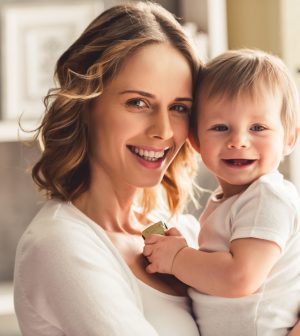- Could Your Grocery Store Meat Be Causing Recurring UTIs?
- Are You Making This Expensive Thermostat Error This Winter?
- Recognizing the Signs of Hypothyroidism
- 10 Strategies to Overcome Insomnia
- Could Artificial Sweeteners Be Aging the Brain Faster?
- Techniques for Soothing Your Nervous System
- Does the Water in Your House Smell Funny? Here’s Why
- Can a Daily Dose of Apple Cider Vinegar Actually Aid Weight Loss?
- 6 Health Beverages That Can Actually Spike Your Blood Sugar
- Treatment Options for Social Anxiety Disorder
Motherhood Doesn’t Lower Survival for Women Who’ve Had Breast Cancer

Breast cancer survivors who would like to have a baby can take some reassurance from a new study that finds motherhood doesn’t lower their future survival chances.
Moreover, survival rates were no worse in younger women, those who had not been pregnant before or those with hormone receptor-positive breast cancer, according to researchers from the University of Edinburgh in Scotland.
“This analysis shows that having a baby after breast cancer doesn’t have a negative impact on survival,” said Richard Anderson, a professor in the university’s center for reproductive health. “It provides reassurance for the growing number of women who want to start or complete their families after breast cancer treatment.”
Many breast cancers are hormone-sensitive, and it has been thought that rising hormone levels during pregnancy might increase the odds of breast cancer returning or reduce survival chances. Tumor cells are stimulated to grow by the hormones estrogen and progesterone.
To study the question, the researchers used patient data from the Scottish Cancer Registry and national maternity databases. Nearly 5,200 women younger than 40 had a breast cancer diagnosis made between 1981 and 2017. Pregnancies were included up to the end of 2018. Survival was also analyzed until late 2018.
The researchers analyzed the data of 290 women who had a live birth after breast cancer diagnosis. The results showed that their overall survival was higher compared with those who didn’t have a birth after their breast cancer diagnosis.
The findings were presented Tuesday at the annual meeting of the European Society of Human Reproduction and Embryology. Findings presented at medical meetings are considered preliminary until published in a peer-reviewed journal.
The investigators also analyzed tumor stage, previous pregnancy and age at diagnosis.
Survival was higher in those who had a first-time pregnancy after having breast cancer, the research team found. Women who had been pregnant before having breast cancer showed similar survival rates whether they later had a baby or not.
A younger age at diagnosis and then becoming a mother later was also associated with increased survival. All age groups showed increased or similar survival compared to women who did not have a baby after diagnosis.
Most women who had a baby after diagnosis did so within five years, the study authors noted in a meeting news release.
More information
The American Cancer Society has more on pregnancy and breastfeeding after breast cancer.
SOURCE: European Society of Human Reproduction and Embryology, news release, July 5, 2022
Source: HealthDay
Copyright © 2026 HealthDay. All rights reserved.










